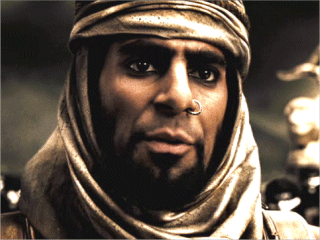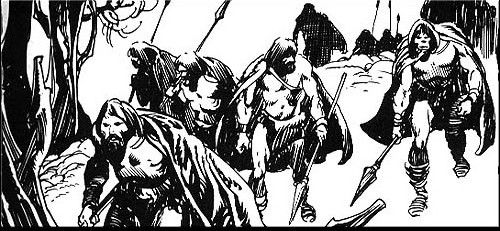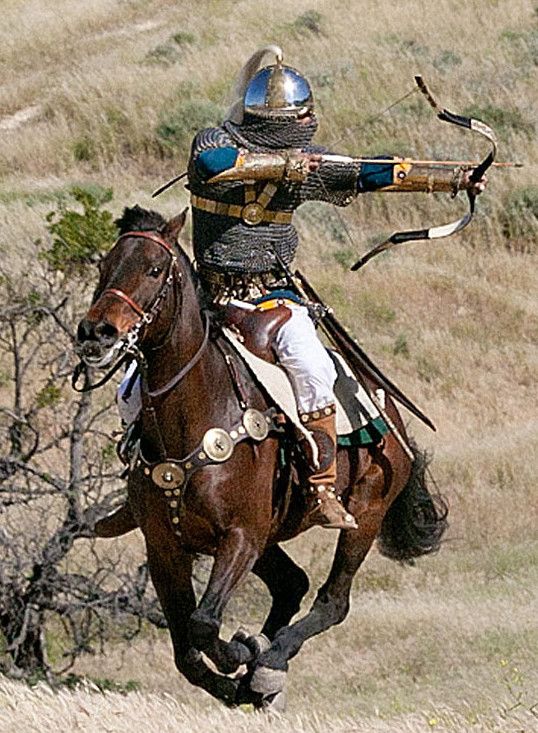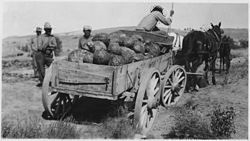
Captain Kavadh had been tasked with mapping Eastern Asia after the Princess had negotiated open border agreements with both China and Japan. Kavadh's expeditionary group of Persian Immortals had successfully mapped most of China, although there had been a few incidents along the way. Qin had informed the Princess that Kavadh's troops would be met with Chinese virgins throwing themselves at the Persian forces. This had been a major concern of Kavadh's as he knew nothing derailed discipline like a group of willing women.
As advertised, young Chinese women greeted the Kavadh's troops the moment they made camp the first night they spent in China. Every time camp was made, it seemed out of nowhere a flock of young women found there way into the camp. Some of them may have been virgins at first, or that may have just been poetic license. Either way it made Kavadh's job a lot more difficult.
Kavadh knew that General Nizami had sent him on this mission because he had made a mess of his last assignment during the Medean rebellion. On his last assignment his troops had lacked discipline and a group of rebels had caught the company in an ambush and scattered the Persian troops. If he failed this mission the command structure might just have him publicly killed.
Keeping the men in line took every fiber of Kavadh's being. His men had never respected him. When he ordered them to do things he always had to use violence to make them listen. The first time several of his men did not report for morning roll call, he knew he had to act decively or this problem would get worse. The missing men were all from the same squad and Kavadh had the two members of the squad that were on sentry duty the night before executed and threatened the same to any sentry pair who allowed their squadmates to leave camp. The problem did get better and only a few more executions had to be performed. But his men grumbled.
Once they left China and started into Japanese territory the problem disappeared. The Japanese women were apparently less interested in the Persian soldiers. The Japanese people seemed, in fact, tense at the arrival of Kavadh's troops. The formerly strained relations between Japan and Persia apparently were felt by the Japanese populace. When passing a monastery a group of beautiful female poets came out to greet the men. They were the first Japanese to express any interest in the passing Persians. The youngest and prettiest was named Katsumi and she was often seen walking with Kavadh. Katsumi recited poetry to Kavadh and Kavadh happily presented her with a few ill-remembered Persian poems and drinking songs. The men pretended not to see them as they walked the perimeter of the camp.
When Kavadh's troops came up to Kawamura it became clear that something was wrong in the woods to the east of the city. He ordered his outriders to investigate and when they returned they reported that a group of Japanese soldiers were camped in the woods and were preparing to hunt down a group of savages that had taken up residence in those woods. Kavadh ordered his company to make for the Japanese camp and upon arrival Kavadh dismounted and went to speak with the Japanese captain. The captain seemed unexcited to see the Persian expedition, but he had a more pressing problem at the moment. Glowering the entire time, the Japanese captain explained about the band of barbarians that was hiding in the woods to the south of their position and that their forces were at a standoff, waiting for reinforcements. Kavadh saw a chance to stop his men from complaining of the boredom, so he offered to send his men into the forest to drive the barbarian forces into the open.
Kavadh gathers his squad leaders and relays to them the situation. They are eager to stain their blades with the blood of foes and are only too happy to relay the news of the upcoming encounter to their men. For two days the camp hummed, not with the usual grumbling and brawling, but with the hum of men happily sharpening weapons and performing maintenance that had previously seemed dull, but that right now had purpose. On the third day Kavadh gives the order and the entire company moves out. Throughout the day the outriders come constantly pouring in reporting each enemy sighting and potentially strategic position. Kavadh's plan was to drive the barbarians out into the open land beyond the forest where the Persian and Japanese forces could cut the barbarian ranks to pieces between them. Word reaches him that Yek squad has initiated battle with a group of barbarian forces, and soon Seh and Panj squads are also in combat. Once the soldiers came upon the enemy, they were all but impossible to control, and Kavadh's battle plan was not possible to implement, but it seems the excitement of the Persian soldiers for battle keeps them driving forward swarming barbarian outposts and massacring all occupants. Kavadh could do little but watch and listen to the reports of his field scouts, but the reports were all good. The barbarians are falling left and right and by the time the Persian forces emerge from the forest, there are only a few barbarians to chase down and kill. Various squads race each other for the privelege of running down the remaining enemies and spear after spear and arrow after arrow plunges into the backs of the retreating enemy.


Kavadh orders Chahaar squad to gather as many barbarian heads as they can find into a wagon. Kavadh watches the men as they happily go about their gruesome work.

The men laugh and toss heads at one another seemingly oblivious of the lack of sophistication they are showing. Kavadh cannot help himself but to smile. The men will be beaming with pride and discipline for at least a few weeks and they will be much easier to handle.
Once the wagon is loaded the entire company marches in perfect order, blood still staining their clothing and covering their faces. None of the soldiers wipe the blood off their skin, wearing the blood as though it were the highest medal of merit, and to them it was. Kavadh mused that his troops made for quite the sight to the peasants whom they were passing. It is dusk before they make it back to the Japanese camp. Kavadh has the wagon of heads driven right up into the middle of the Japanese camp, dismounts, and pulls the cover off the wagon personally. The Persian troops with dried blood all over themselves and the wagon full of heads which had already begun to smell captures the attention of every Japanese soldier in the vicinity. The Japanese captain clears his throat and thanks Kavadh in a very formal Japanese ritual, orders his men to dispose of the contents of the wagon, and inquires of Kavadh whether the Persian troops are leaving in the morning. Kavadh, full of pride himself, laughs and promises that his men will be leaving in the morning and must continue with their mission. Kavadh thinks to himself that the Japanese must think his men nearly as barbarous as the men who used to own the heads in the wagon. The Japanese soldiers are very polite to the Persians but are visibly relieved when the Persian forces vanish from the horizon.
Although the Persian wild vitality felt out of place amid the harmony of the Japanese, the Japanese slowly warm to the Persian outsiders. Several times Japanese horse trainers asked for assistance with the untamed horses that roamed the Japanese grasslands. The men seem in extremely high spirits and beam when they are able to show a few horsemanship tricks to the locals. Kavadh has never seen his men in such spirits and it seems as though the serenity and harmony of the Japanese people and countryside when mixed with the raucous virility of the Persian soldiers made a good combination. The men eventually got used to seeing Katsumi riding alongside their captain to the point where when she was not in her usual place a flurry of concerns would flicker through the ranks. They had many more miles to go and Kavadh knew his work had just begun.
Comment